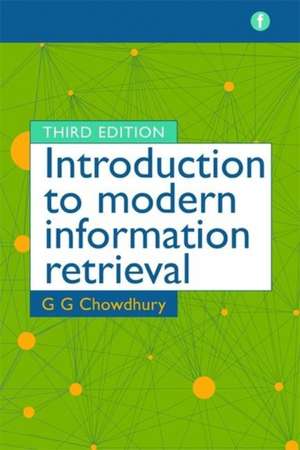Introduction to Modern Information Retrieval
Autor G. G. Chowdhuryen Limba Engleză Hardback – 31 mar 2019
Preț: 729.04 lei
Preț vechi: 1169.11 lei
-38% Nou
Puncte Express: 1094
Preț estimativ în valută:
139.51€ • 145.84$ • 117.89£
139.51€ • 145.84$ • 117.89£
Carte nepublicată încă
Doresc să fiu notificat când acest titlu va fi disponibil:
Se trimite...
Preluare comenzi: 021 569.72.76
Specificații
ISBN-13: 9781783303229
ISBN-10: 1783303220
Pagini: 528
Dimensiuni: 156 x 234 x 34 mm
Greutate: 0.05 kg
Ediția:3
Editura: Facet Publishing
Colecția Facet Publishing
ISBN-10: 1783303220
Pagini: 528
Dimensiuni: 156 x 234 x 34 mm
Greutate: 0.05 kg
Ediția:3
Editura: Facet Publishing
Colecția Facet Publishing
Public țintă
Professional Practice & DevelopmentCuprins
1. Basic concepts of information retrieval systems Introduction Features of an information retrieval system Elements of an information retrieval system Kinds of information retrieval systems Design issues Discussion References 2. Database technology Introduction Data The database Kinds of databases Database technology The development of databases in an information retrieval environment Discussion References 3. Bibliographic formats Introduction Bibliographic records ISO 2709: Format for bibliographic information interchange MARC format UNIMARC format The Common Communication Format Discussion References 4. Cataloguing and metadata Introduction Cataloguing Metadata Discussion References 5. Subject analysis and representation Introduction Classification Types of bibliographic classification schemes Major library classification schemes Classification of electronic resources Subject analysis Manual indexing Theory of indexing Discussion References 6. Automatic indexing and file organization Introduction The process of indexing Automatic classification Index file organization Inverted file Sequential access Alternative text retrieval structures Discussion References 7. Vocabulary control Introduction Controlled vs natural indexing Vocabulary control tools Thesauri Criteria for evaluating a thesaurus Use of thesauri in online information retrieval Discussion References 8. Abstracts and abstracting Introduction Types of abstract Qualities of abstracts Uses of abstracts The art of abstracting Automatic abstracting Recent works on text summarization Discussion References 9. Searching and retrieval Introduction The search strategy and its prerequisites The pre-search interview The searching process Retrieval models Alternative information retrieval models Search facilities offered by most text retrieval systems Discussion References 10. Users of information retrieval Introduction Users and their nature Types of information needs Information needs in different areas of activity Information-seeking behaviour of users What we need to know about users User studies Possible sources of information about users Discussion References 11. User-centred models of information retrieval Introduction Information seeking Human information behaviour models User-centred information search models Discussion References 12. User interfaces Introduction The four-phase framework for interface design Information seeking and user interfaces User interfaces and visualization User interfaces of some information retrieval systems Discussion References 13. Evaluation of information retrieval systems Introduction The purpose of evaluation Evaluation criteria The steps of evaluation Discussion References 14. Evaluation experiments Introduction The Cranfield tests MEDLARS The SMART retrieval experiment The STAIRS project Limitations of early evaluation studies TREC Discussion References 15. Online and CD-ROM information retrieval Introduction Online searching CD-ROM databases Discussion References 16. Multimedia information retrieval Introduction Multimedia information retrieval systems Standards Discussion References 17. Hypertext and markup languages Introduction Hypertext Markup languages Discussion References 18. Web information retrieval Introduction Traditional vs web information retrieval Web information: volume and growth Web information retrieval: issues and challenges Access to information on the web: the tools Economic aspects of web information and search engines Deciding which pages to return Search engine optimization Web information retrieval: evaluation studies Information seeking on the web Discussion References 19. Natural language processing and information retrieval Introduction Natural language understanding Syntactic analysis Semantic analysis Pragmatic knowledge Discussion References 20. Natural language processing applications in information retrieval Introduction Cross-language information retrieval Machine translation Question answering systems Text mining Information extraction Discussion References 21. Citation analysis and information retrieval Introduction Bibliometrics, scientometrics and webometrics Citation indexes and information retrieval Discussion References 22. Information retrieval in digital libraries Introduction Information resources in digital libraries The basic design of a digital library Interoperability Common features of digital libraries Information retrieval features of selected digital libraries Problems and prospects Discussion References 23. Trends in information retrieval Introduction Evaluation of information retrieval systems Developments related to the input subsystem Searching and retrieval User studies and user modelling User interfaces Information retrieval standards and protocols Information retrieval in the context of web and digital libraries Evaluation of natural language processing systems Machine translation Conclusions References
Notă biografică
Professor Gobinda Chowdhury BSc Hons, MSc, PhD, FCLIP is Professor in Information Science at iSchool@northumbria, and Head of the Department of Mathematics and Information Sciences at Northumbria University.
Descriere
It is this book's contention that it benefits professional to learn the theory, techniques and tools that constitute the traditional approaches to the organization and processing of information. The fully revised third edition of this highly regarded textbook has been thoroughly updated to incorporate major changes in this rapidly expanding field.
